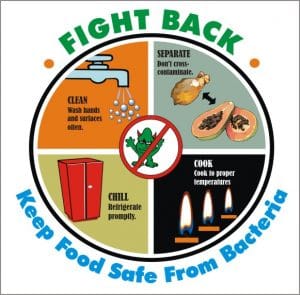Keep Food Safe

If you have ever had food poisoning you know how miserable it is. Upset stomach, vomiting, diarrhea, abdominal cramping, and dehydration are no picnic. Food poisoning, or food borne illness, is mostly preventable. I say mostly because if you are eating food that you have not prepared the food safety is pretty much out of your control.
Food borne illnesses are caused by bacteria, parasites, or viruses that have contaminated food or beverages. Contamination can occur during growing, harvesting, processing, storing, shipping, or preparation either at home or in a restaurant. Raw foods are the most common source of bacteria because these foods they are not sterile. Raw meat, fish and poultry are not the only problem. Fresh fruit and vegetables can be contaminated as well.
Most cases of food borne illnesses resemble intestinal flu and may last a few hours to several days. Some types of food poisoning are far more serious and may require hospitalization. The Centers for Disease Control and Prevention estimates that about 76,000,000 people in the U.S. get sick every year from food borne illnesses and about 5000 people die. Young children, pregnant women, older adults, and those with compromised immune systems are at the greatest risk.
Prevention is the best policy. Take these precautions to keep those nasty microorganisms out your body.
- Wash your hands thoroughly before and after preparing food and after using the bathroom.
- Keep raw meat, fish, and poultry away from foods that will not be cooked.
- Cook foods to the proper temperature to kill bacteria.
- Clean countertops, cutting boards, knives, and other preparation utensils after using them.
- Refrigerate foods within 2 hours or less after cooking.
If in doubt, throw it out!
Eat Smarter…..
Vicki Bovee, MS, RDN, LD
